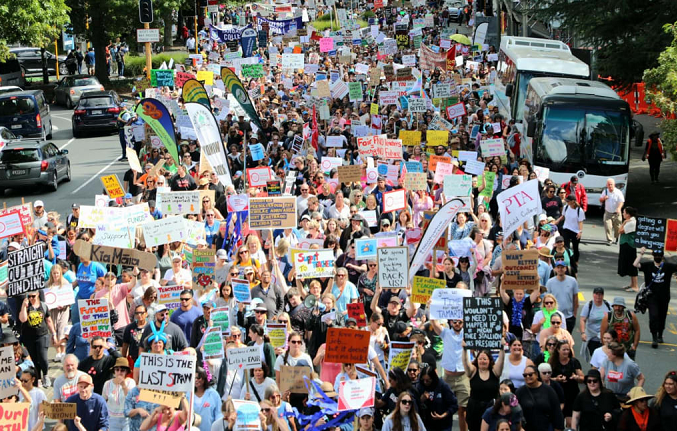Primary teachers reach deal with government over pay, conditions
RNZ
06 June 2023, 8:29 PM

Primary teachers have voted to accept the latest Ministry of Education collective agreement offer.
In a statement this morning, NZEI Te Riu Roa said the offer was the fourth put to teachers.
It followed a long negotiation campaign which included the largest education strike in this country's history.

A teachers' protest march in Auckland on 20 March. Photo: RNZ / Jordan Dunn
The settlement includes a six percent pay increase in July, with two further increases in July and December 2024.
A lump sum payment of $3000 would be made in July, plus an additional $1500 for union members.
Classroom release times will increase from 10 to 25 hours per term and mileage allowances are to go up.
NZEI Te Riu Roa president Mark Potter said the more than doubling of classroom release time was the biggest win and the first increase since 2005.
"The work demands on teachers have skyrocketed in the last couple of decades and this means teachers will have more time to plan, assess and do individual work with students."
The settlement also includes "significant" increases in Māori Immersion Teacher Allowance, the introduction of the Pasifika Bilingual Immersion Teaching Allowance, a rise in the reliever pay cap, and provisional to full certification costs paid for beginning teachers.
Potter said moving the cap on reliever teacher pay rates was a step toward paying experienced relief teachers fairly, and should make it easier for schools to find relievers.
Paeone Goonan, a resource teacher of learning and behaviour based at Ōpōtiki College and a member of the negotiating team, said the introduction of the cultural leadership allowances and the increase to the Māori Immersion Teaching Allowance were "historic
improvements".
"They acknowledge the skills and expertise of those kaiako and their culture and will compensate those teachers who are doing the mahi anyway, such as assisting with the new Aotearoa histories curriculum or teaching kapa haka."
Last week, primary teachers called off strike action as they awaited the revised government offer.
Primary teachers have previously told RNZ they were striking for the children.
Newtown Primary School deputy principal Leanne Whitfield said previous offers from the ministry were not good enough.
"The pay jolt we got a few years ago has mostly disappeared through inflation, but actually the impact on teachers through dealing with a very wide range of needs in our classrooms is a much greater problem at the moment."
She said people would be shocked if they knew how under-resourced schools were.
Teacher Mary Bluck previously said a pay rise was not the most important issue for her.
"It's about work conditions, smaller class sizes and greater support for our students," she said.
"I'm striking for our children. Our children at this point in the junior school have not had a normal school or education life due to Covid and so they have greater needs and we don't have the resources to support them in the way we'd like."





